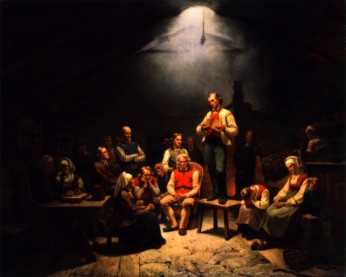| 19th
century Protestant movements in Germany and Scandinavia, emphasizing
revivals and social service. |
 |
|
"The
Haugeans" by Adolf Tiedemand, depicts prayer meeting
|
Industrialization
created poverty among working families in the cities, and left many outside
the reach of European state churches. Responding to these conditions was
a network of volunteer movements whose goals of evangelism and social
service stemmed from Pietism. Hans
Nielsen Hauge, a lay preacher who became the leader of a spiritual
awakening in Norway, emphasized conversion and holy living. In Stockholm
Carl Rosenius (1816-1868) sought to awaken faith within the state church
of Sweden. In Germany in 1848-- the year of revolutions and worker-uprisings
throughout Europe--Johann Wichern (1808-1881) founded the "Inner Mission."
Its aims were to link all German Protestant charities and to revitalize
Christian witness among the industrial masses. Amelia
Sieveking mobilized women in humanitarian work. The Inner Mission
emphasized the role of the laity and the power of Christian love to heal
social ills. In the United States, Evangelicalism
and the Social Gospel had goals similar
to those of the European Awakenings and Inner Mission.
|